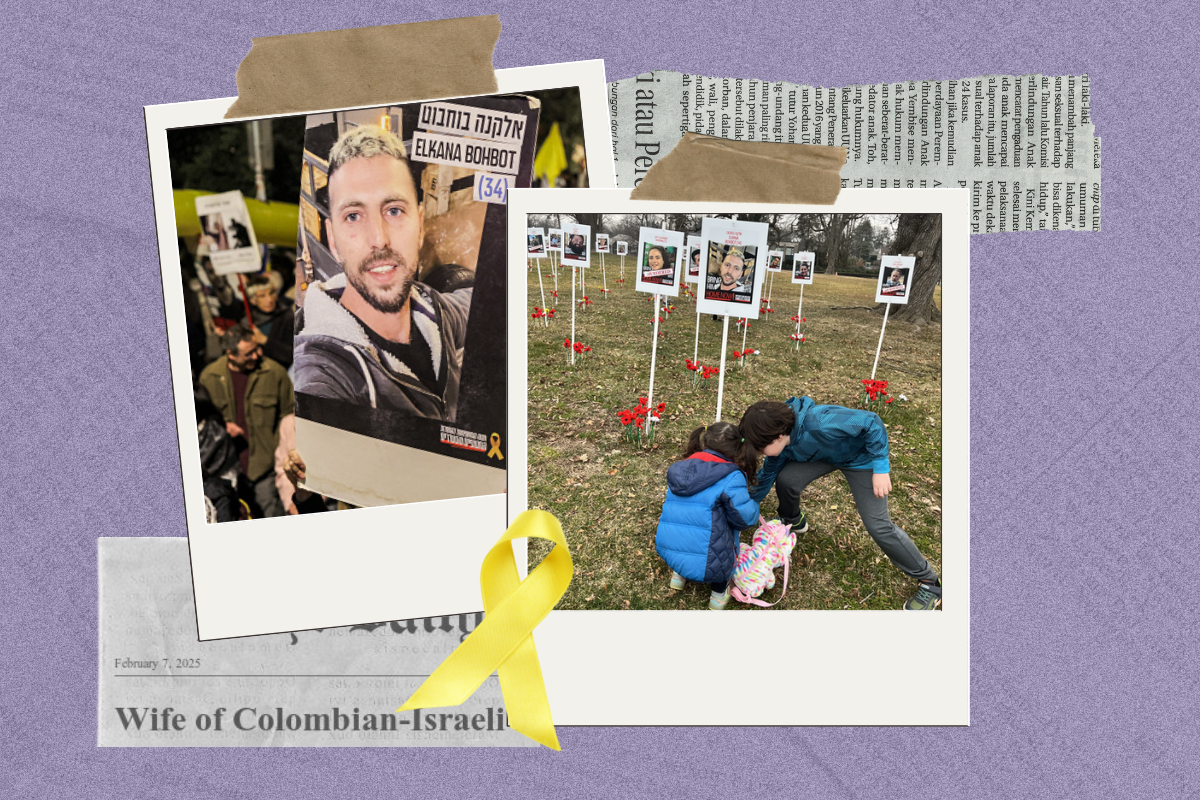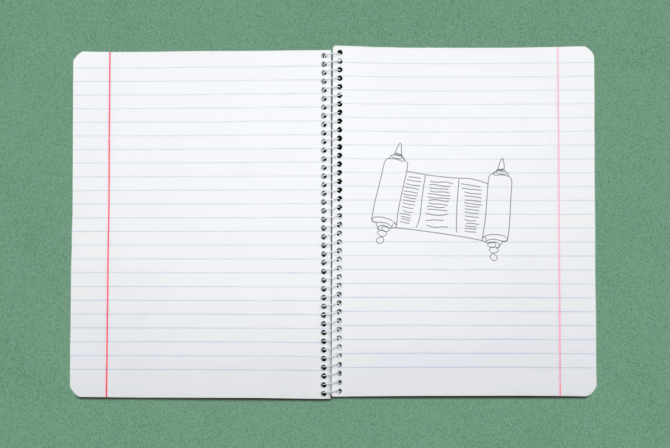I don’t remember the first time I heard the word “hostages” post October 7. Was it that day, or was it already days later? The news crept in in fragments, each piece more devastating than the last. The scale, the elaborate terrorist plot – all I remember is feeling disoriented. It was too much to hold, too much to understand.
On one of those days, my mother burst through the front door of my home. Without thinking, without looking around, she told me for the first time that one of our relatives, Elkana Bohbot, was being held hostage. This was before we were counting them, before we knew all their names by heart, before one day stretched to 500.
My oldest, age 10, was sitting at the living room table. I saw him turn his head towards her. He was listening.
My mom is Israeli, born on a moshav called Sde Zvi, about a half hour from kibbutz Be’eri. She is the only one of her 10 siblings who lives outside of Israel. Our entire family is there.
“Why did Eema say that in front of him?” I lamented to my sister on the phone later that night. “Why wasn’t she more careful?” I felt fiercely protective, helpless to the information my son now indelibly knew.
But in the weeks that followed, I found myself feeling a new emotion: gratitude. The information my mother had heard from her cousins was confirmed – Telegram footage of Elkana, bound by ropes, an arm clearly injured, abject fear in his eyes. Scrolling through Instagram, between ads for soap and ramen recipes, I would be caught suddenly by his eyes.
I never showed my son the video and I never will. But I realized it was necessary for him to know the basics of the truth. And I felt grateful I hadn’t been the one who had to find the words to tell him.
My son seems to always be thinking of Elkana. Our synagogue put up a beautiful display for the hostages, signs adorning their front lawn like little mile markers, one for every hostage. My oldest raced around, his coat flapping in the fall breeze, looking for Elkana. He found the poster: “Elkana Bohbot, 34” My oldest helped my youngest fashion flowers out of pipe cleaners and affix them to the signpost.
Our synagogue also has a table at kiddush that is “reserved” for the hostages. Every month or so, they rotate through the famous red and black posters, taping them to the back of chairs. A few weeks ago, Elkana made his first appearance. In the picture, Elkana holds his own child, a 3-year-old. “Safta!” my son called as my mom walked into the hall. “Safta! Elkana is here!” He took her hand and led her over to see.
Like so many other families, the Bibas family also became a part of our lives. I explained to my oldest that the youngest hostages were a baby, just 9 months old, and a child who is 4 – the same age as his sister. Like every other parent, I tried to explain the barbarism that would cause a person, a people, to capture and hold children. Like every other parent, I failed, because there is no explanation. Still, it felt important to try.
On Ariel Bibas’ 5th birthday, we lit an orange candle. I showed my kids the now-iconic video of Ariel running around with a Batman cape. My son exited the kitchen and re-emerged from the playroom with a black cape on. “Like Ariel,” he said simply. His sister, never one to be left out, soon followed suit, donning a gray mask with yellow piping. They played superheroes all afternoon.
We do about 45 minutes of bedtime every night, just me and my oldest, in my bed. It is the one time in the day when his siblings are tucked in, when I am done with dishes and laundry and work, and when we have time to talk. I ask how things are at school, what’s going on with friends or his crush, and some nights, we talk about what is happening in Israel. “There are no days I don’t feel sad about it,” he said one time.
With the recent wave of hostages released, we received the most incredible news: a sign of life. Hostages who had been released reported that they knew Elkana – that he was alive. This was the first real information his family had received since that Telegram footage.
When bedtime came around, I told my son the news. His eyes widened. He stood up on the bed. He grinned widely. Slowly, he started bouncing. And out of his mouth poured prayer. First a verse from the Amidah, the part that begins “atah gibor l’olam Adonai,” coincidentally about resurrecting the dead. Then the second half of Kiddush — the part everyone joins in to sing together each week at our Shabbat table. Then Ve’ahavta – skipping the more famous first two lines – then, Adon Olam, as if he was wrapping up a service. Every prayer he could think of, anything he had learned at Hebrew school, he recited while continuing to jump up and down, swinging from the sturdy top beams of the four-poster bed, moving his body across the whole king mattress. There didn’t seem to be any rhyme or reason to what came next. His instinct was simply to pray.
I stared at him in awe, quietly saying “amen” to each stanza. Finally, he slowed. He sat down on the bed cross-legged, panting. “Your turn, mom.” I suddenly felt out of breath, too. I said the Shema. I said the Mourner’s Kaddish. I said Hatikvah.
Some days I feel tremendously guilty. Why should a 10-year-old have to know any of these things at his age? Isn’t it my job to shield him from the unbearable truth of an unfair and unjust world? Other days I feel proud — proud that he is prepared, proud that he understands, proud that he knows what it really means to be a Jew.
Last week, the day we learned the horrible fate of the Bibas children, I could not bring myself to tell my son. I have been holding it in my throat like something I am liable to choke on. How do I explain to him that a child his sister’s age was hunted, stolen and murdered by terrorists? I fight with myself: Tell him the truth. No, protect him. Tell him so no one else tells him first. No, let him be a child — even for just a few minutes longer. I will tell him. I have to. But on the day it happened, the day we finally knew for sure? No, not yet.
My son’s first time reading Torah is coming up. We added 10 minutes of practice to our bedtime routine each night. What else can I do? Elkana is still waiting in hell with 65 others, his own son waiting for him at home. The precious, gorgeous, innocent Bibas children are in coffins, as is their sweet mother, Shiri. What can we do but jump up and down, praying or screaming or crying, celebrating any tiny modicum of good, lamenting all the horrific bad and prostrating ourselves before God for whatever is in between?
The only thing I can think to do is keep the candle of Judaism burning for the next generation. To keep it alive. To stay alive. For those who are not alive.








